The Birth of Theory
ANDREW COLE
The University of Chicago Press
Chicago and London
Andrew Cole teaches in the Department of English at Princeton University. He is the author of Literature and Heresy in the Age of Chaucer and coeditor of The Legitimacy of the Middle Ages: On the Unwritten History of Theory.
The University of Chicago Press, Chicago 60637
The University of Chicago Press, Ltd., London
2014 by The University of Chicago
All rights reserved. Published 2014.
Printed in the United States of America
23 22 21 20 19 18 17 16 15 14 1 2 3 4 5
ISBN-13: 978-0-226-13539-7 (cloth)
ISBN-13: 978-0-226-13542-7 (paper)
ISBN-13: 978-0-226-13556-4 (e-book)
DOI: 10.7208/chicago/9780226135564.001.0001
Library of Congress Cataloging-in-Publication Data
Cole, Andrew, 1968 author.
The birth of theory / Andrew Cole.
pages ; cm
Includes bibliographical references and index.
ISBN 978-0-226-13539-7 (cloth : alkaline paper)ISBN 978-0-226-13542-7 (paperback : alkaline paper)ISBN 978-0-226-13556-4 (e-book)
1. Hegel, Georg Wilhelm Friedrich, 17701831Influence. 2. DialecticHistory. 3. Theory (Philosophy) I. Title.
B2949.D5C635 2014
121dc23
2013037618
 This paper meets the requirements of ANSI/NISO Z39.48-1992 (Permanence of Paper).
This paper meets the requirements of ANSI/NISO Z39.48-1992 (Permanence of Paper).
for Cathy
Centuries and centuries of idealism have not failed to influence reality.
JORGE LUIS BORGES
The philosopher wishes to preserve a number of fixed values; he is frightened by the bohemians dialectical reversals.
JEAN HYPPOLITE
Alter ideas and you alter the world.
FORTUNE COOKIE, Szechwan House, Hamilton, NJ
Contents
Preface
Very like a Whale
All things counter, original, spare, strange.
GERARD MANLEY HOPKINS
Whales arent just for syllogismsnor are they only for bestiaries. Just ask Melville, who delighted in the thought of the whale and saw the leviathan as something more than a mammal, more than a vertebrate, and nothing short of a marvel, noting its perception to be far keener than the one-eyed pisciform surface depicted in so much traditional art.
Melville tells a bloody tale of whale harvest in his great novel, but along the way he pauses to revere the whale. At one moment, he goes so far as to think like a whale and invites us to think along with him. So lets try. Imagine rejigging your head so that your eyes are located at your ears, like the whales eyes, on each side of its head. In this case, says Melville, you would have two backs, so to speak; but at the same time, also, two fronts (side fronts): for what is it that makes the front of a manwhat indeed, but his eyes. So it goes with the whale, which must see one distinct picture on this side, and another distinct picture on that side; while all between must be profound darkness and nothingness to him. And herein lies a curious and most puzzling problem, easier to describe than perform, because no human has the mental capacity to process at once two distinct pictures shining at each eyeball: It is quite impossible for him, attentively, and completely, to examine any two things... at one and the same instant of time.... But if you now come to separate these two objects, and surround each by a circle of profound darkness; then, in order to see one of them, in such a manner as to bring your mind to bear on it, the other will be utterly excluded from your contemporary consciousness. Profound darkness and nothingness overcome you, and you cannot think. For to see two things at once is possible only on two conditions: you would either have to be a whale yourself, or be gifted with a cetacean mind and a leviathan imagination:
How is it, then, with the whale? True, both his eyes, in themselves, must simultaneously act; but is his brain so much more comprehensive, combining, and subtle than mans, that he can at the same moment of time attentively examine two distinct prospects, one on one side of him, and the other in an exactly opposite direction? If he can, then is it as marvellous a thing in him, as if a man were able simultaneously to go through the demonstrations of two distinct problems in Euclid. Nor, strictly investigated, is there any incongruity in this comparison.
The thrill of thinking, the pleasure of thought, comes in this moment of combining... two distinct prospects across the great expanse, overcoming nothingness in turn.
Hegel, had he the chance, would have called the whale dialectic. It is not hard to see why. For dialectic, like the whale, regards two distinct pictures, two different ideas, and combines them into a single thought. But from what depths did this whale-like thought process emerge in Hegel? The origins of dialectical thinking have long been mysterious. Hegel didnt invent this dialectic, as he knew perfectly well. He realized that the roots of his dialectical thinking traced back not to antiquity, when the old discipline of dialectic began, but to that age once deemed a darkness itself, the Middle Ages. It was in the Middle Ages that dialectic took on a specific logical formthe dialectic of identity and differencedesigned to solve problems that never worried the ancients, such as the problem of nothingness as an absolute negativity. Hegel recuperates the dialectic of identity and difference, and, in so doing, he largely erases the marks of his debt to the Middle Ageswhich is why the link between Hegel and medieval dialectic has never been satisfactorily discussed in the philosophical and theoretical traditions he begot.
In this book, I demonstrate how Hegels dialectic emerged from the philosophical practices of medieval thinkers, mapping as precisely as possible the lineaments of Hegels debt and the implications of acknowledging that debt (effects of his choicethat the daring extension of the medieval discipline of dialectic into modernity would ultimately lead to what in the twentieth and twenty-first centuries is called theory.
Hegel responsible for theory? Today theory generally names the kind of critical thinking applied against figures like Hegel, while any mention of Hegel in a conversation about theory implies the Frankfurt School and critical theory, where Hegel fares only marginally better. Granted, Theodor Adorno and Herbert Marcuseto take two leading figuresturn to Hegel in an effort to develop a Marxist critique of culture only notionally present in Marx, offering aesthetic theories that do not double as economic laws. While both find Hegel useful, they clearly indicate that Hegels dialectic stands for ideology: Marcuses observation that the very structure of capitalism is a dialectical one is repeated in Adornos claim that mass culture has finally rewritten the whole of Hegels Phenomenology of Spirit. This Adornian idea of threading the Hegelian needleworking in oppositional accordance with the dialecticexemplifies the way in which theory has placed Hegels works behind a mediating concept called Hegelianism: a sort of translucent scrim that reveals the general outline of Hegels thought but obscures its details and complexities. Under the rubric of theory, it becomes impossible to think of Hegel himself in any clear or straightforward way.
The aim of this book is to get behind that mediating scrim in order to think about Hegels work directly, unencumbered by the weight of Hegelianisms and energized by his daring appropriation of the dialectic of identity and difference. It is also to indicate something specific by the word theory. By theory I mean, above all, the move away from philosophy within philosophy itself. Even as Hegel retained Kants idea of philosophy, he completely broke it apart from within, placing inside the modern academic discipline a figure, a form of thought, that is decidedly medieval and indelibly
Next page

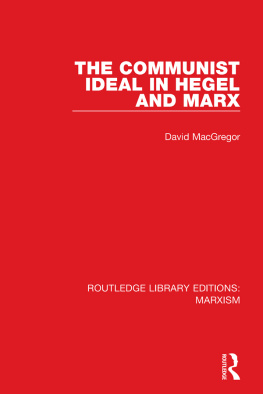
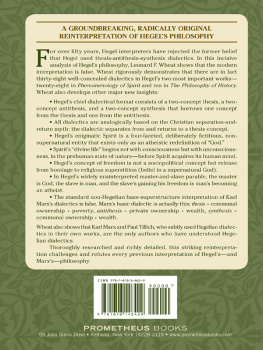
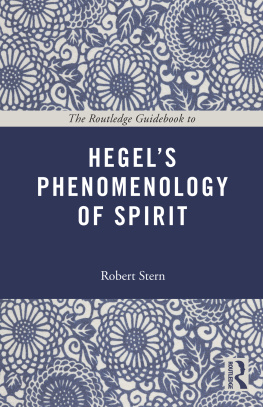


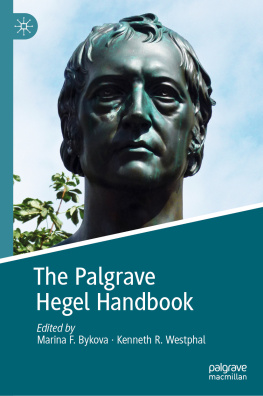
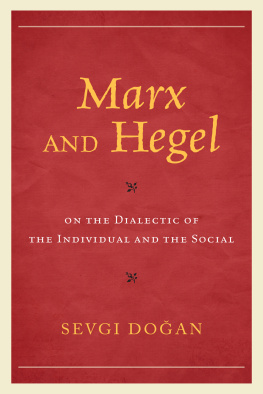
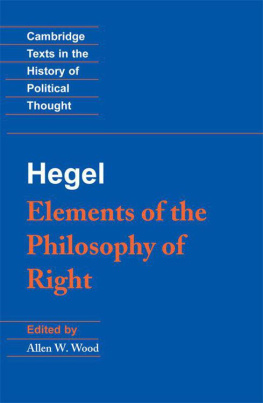
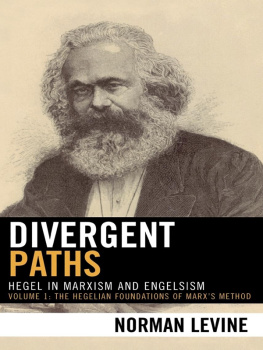
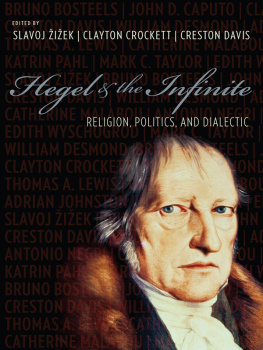
 This paper meets the requirements of ANSI/NISO Z39.48-1992 (Permanence of Paper).
This paper meets the requirements of ANSI/NISO Z39.48-1992 (Permanence of Paper).